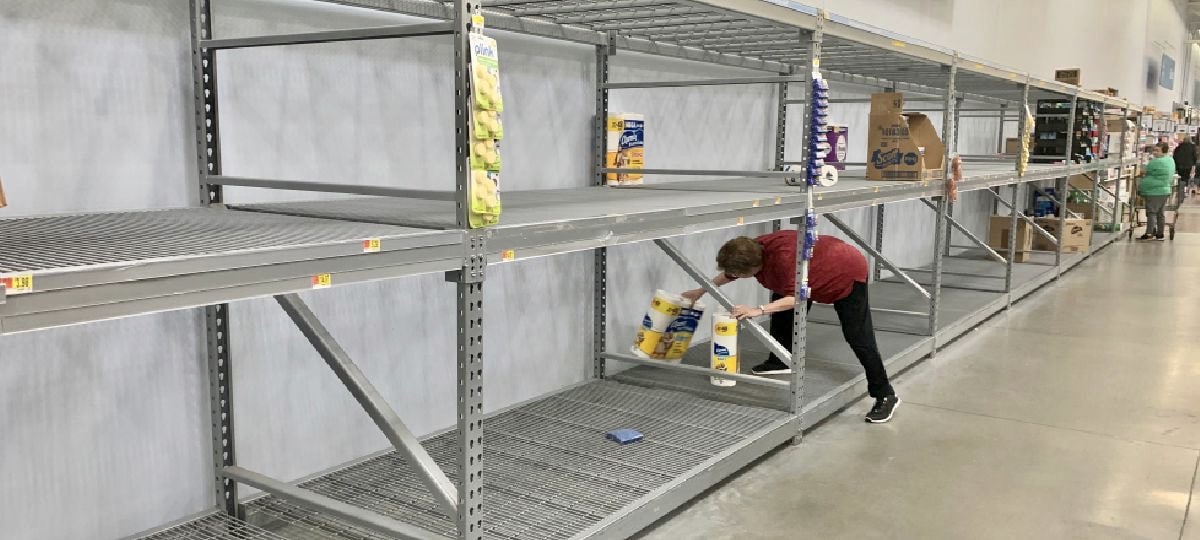Amidst the continued spread of COVID-19, anti-price gougers have been hard at work on social media to expose the supposed moral tragedy of price gouging: greedy and exploitative sellers raising prices of necessary goods to massive heights when consumers need them most. Take the following tweet as an example:
This store in NYC was fined for price gouging. Was selling 8 ounce purell, which before all of this sold for $2.50, for $50 each, a 1900% increase (via @ninapineda7) pic.twitter.com/YAnCQv6X4j
— Darren Rovell (@darrenrovell) March 13, 2020
This tweet is meant to tug on our heartstrings so that we pour out our grievances for the every-day consumer and harbor anger towards price-gouging sellers. But is it really the case that this New York seller is just flat out greedy and exploitative? Or is it possible that this seller is performing a valuable market function by conveying an intense shift in consumer demand? Basic economics tells us to bet on the latter.
“Price gouging,” which is dramatically named, is nothing more than an intense shift in prices directly resulting from an intense shift in consumer demand. These prices do not manifest from a sudden desire to take advantage of consumers, but a realization on behalf of the seller that consumers are actually willing, under no threat of coercion, to voluntarily pay higher prices for particular goods.
Price gouging turns out to be the one method that prevents shortages during times of crisis and, to the surprise of many, is a function of consumer demand as opposed to seller “greed.”
The Demand Side of Price Gouging
As we all know, Purell has been extremely hard to find (except in places where it costs $50 per bottle) as COVID-19 continues to spread. And while some may see it as noble to force sellers to keep Purell prices low—and equally as noble to fine and/or imprison them for letting its price go up—doing so is a near guarantee that the first round of consumers will wipe out the available supply of Purell before the second wave of consumers arrives.
Artificially low prices will always encourage the first wave of consumers to stockpile and hoard unnecessary quantities of Purell at the expense of those who come after.
On the other hand, when the price of Purell is allowed to rise—even—to what some would consider to be morally egregious levels—consumers, instead of hoarding and stockpiling Purell beyond their needs, are forced to economize and cut back on their consumption. This ensures that more Purell is available to a greater number of consumers, albeit at a greater price.
Nevertheless, more consumers having at least one bottle of Purell is preferable to more consumers having none. This logic can, and ought to be, applied to all goods, especially in times of crisis.
The Supply Side of Price Gouging
We now have a fundamental understanding of how price gouging efficiently allocates scarce resources across the consumer base. Fortunately, the case for price gouging is just as formidable when we examine it from the supply side.
While high prices force consumers to economize and cut back on their consumption, these same price levels also serve as an incentive for sellers to ramp up their sales and, by extension, for manufacturers to increase production for the highly demanded goods in question.
Continuing with our Purell example, the law of supply tells us that the price of Purell—and all other goods—is directly related to the quantity supplied of that good. Thus, as consumers willingly drive up the price of Purell through a change in preference, sellers will become more eager to sell it for greater profit. We know that this profit is ethically procured from the fact that so many consumers are willing to buy Purell. As sellers become more eager to profit from Purell, manufacturers will likewise become more eager to invest in the production, thus driving up the price for those factors of production.
These increasing prices, all the way from the factors of production to the finished bottle of Purell on store shelves, signal the market to direct resources towards the creation and distribution of greater quantities of Purell.
Should the government, through legislative fiat, mandate that the price of Purell stay below a certain level, the intensity of consumer demand for Purell is lost and cannot be transmitted up the structure of production. This ensures that the prices of the factors of production for Purell cannot increase. Under these circumstances, consumers cannot rationally expect manufacturers to increase their costs of production to churn out more bottles of Purell for the same price. As a manufacturer, it makes little sense to increase your costs of production if you are going to get the same revenue from your outputs. (This practice will run you out of business, and then nobody ends up with Purell!)
Nevertheless, under anti-price gouging laws, manufacturers are stuck at a decreased level of Purell production while consumers are wiping it off the shelves.
The bottom line is that when sellers charge high prices for goods, it is because they are matching the intensity with which consumers are demanding those goods. In a free market, high prices are a result of an increased demand for the factors of production which ultimately have their root in an increased demand for a finished good on behalf of the consumer.
The Economic Lesson: Gains from Trade
If consumers wanted to pay $5,000 for a bottle of Purell, in what world does it make sense to be mad at the seller for charging that price? Either consumers voluntarily purchase Purell at $5,000 per bottle, or the price falls to meet consumer demand. If the seller refuses to lower prices, no sales will be made and the seller will quickly go out if business.
Earlier, I mentioned that economics tells us not to bet on the fact that high prices are a result of greed. But what if sellers started to charge $500,000 or $10 million for a bottle of Purell? Isn’t that proof that the price of Purell is motivated by seller greed? Maybe so, but this is nothing to worry about. Again, if nobody is willing to voluntarily purchase a bottle of Purell for $10 million, then the seller must lower its prices or go out of business. Clearly, the concern of seller greed is irrelevant when prices are allowed to fluctuate freely. This reminds us that voluntary transactions at any price level—even “price gouging” levels—are always beneficial to both buyer and seller. If this wasn’t the case, no transaction would occur.
While high prices during times of crisis can seem unethical and unjustifiable, we need to remember that they ultimately are a function of consumer demand, not seller greed. Sellers are simply messengers whose job is to convey consumer demand by changing prices to reflect the intensity with which consumers do, or do not want, a particular good.
Letting prices rise maximizes consumer satisfaction by ensuring that the supply of a particular good isn’t wiped out in a matter of days, or to the contrary, left sitting on the shelves for weeks on end. Should panic continue to spread over COVID-19 and prices continue to rise, it is my hope that you can now see why harboring anger towards sellers is no different than shooting the messenger.

Anthony Rozmajzl
Anthony graduated from Grove City College in 2018 with a B.A. in Economics. He has been a student of the Austrian School of Economics for over 7 years and a champion of individual liberty. During the day, Anthony works as a Software Quality Analyst for Deacom, Inc., an ERP software company located in Chesterbrook, PA.
This article was originally published on FEE.org. Read the original article.





3 comments
… [Trackback]
[…] Read More on that Topic: thelibertarianrepublic.com/if-you-hate-empty-store-shelves-you-should-love-price-gouging/ […]
… [Trackback]
[…] Find More on that Topic: thelibertarianrepublic.com/if-you-hate-empty-store-shelves-you-should-love-price-gouging/ […]
… [Trackback]
[…] Information on that Topic: thelibertarianrepublic.com/if-you-hate-empty-store-shelves-you-should-love-price-gouging/ […]